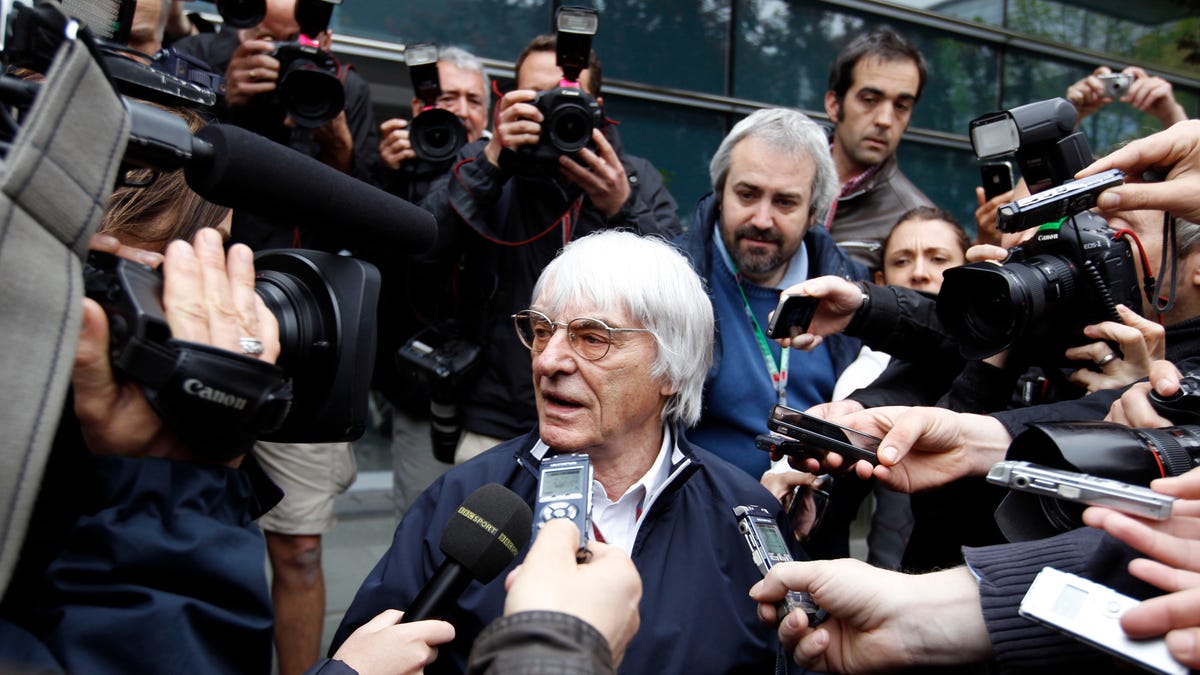
April 13, 2012: Formula One boss Bernie Ecclestone speaks to media after a meeting with team principals between practice sessions for the Chinese Formula One Grand Prix in Shanghai.
MANAMA, Bahrain – Protesters hurled firebombs and riot police fired tear gas Friday, hours after Formula One chief Bernie Ecclestone declared the Gulf nation safe to host a Grand Prix race next week.
All 12 teams told Ecclestone they were happy to travel to the tiny kingdom despite the political unrest. He said no extra safety precautions were being put in place.
"There's nothing happening (in Bahrain)," Ecclestone said in Shanghai before the Chinese Grand Prix. "I know people that live there and it's all very quiet and peaceful."
But clashes broke out after the funeral of activist Ahmed Ismail, who authorities say was killed late last month by gunfire during a protest, although it is still unclear who fired the shots.
"No F1, no F1. ... They killed my son in cold blood," sobbed Ismail's mother, Makyia Ahmed, who said her son had been a volunteer at previous F1 races.
Protesters chanted anti-government slogans and riot police used tear gas and bird shot to clear the crowds. Several people were injured by the bird-shot pellets.
The Grand Prix is the nation's biggest sports event, drawing a worldwide TV audience of about 100 million in 187 countries.
Organizers canceled last year's Grand Prix after the outbreak of violence, which has led to at least 50 deaths. The crackdown by the Sunni-led government was imposed after Bahrain's Shiite majority demanded a greater political voice.
Human rights groups criticized the reinstatement of the race this year, and protesters have galvanized supporters by chanting against Formula One in marches, while criticizing Ecclestone and drivers on social media websites.
Amnesty International warned that "the human rights crisis in Bahrain is not over." The London-based group said that despite authorities' claims that the country is calm and free of political unrest, the "state violence against those who oppose the Al Khalifa family rule continues," referring to the family of the king, Hamad bin Isa Al Khalifa.
"Holding the Grand Prix in Bahrain in 2012 risks being interpreted by the government of Bahrain as symbolizing a return to business as usual," Amnesty's statement said.
A group calling itself the Feb. 14 Coalition -- named for the anniversary of the uprising -- says holding the race is "against our wishes and the feelings of the people of Bahrain."
Said Ecclestone: "We don't get involved in politics in a country. We go to a country like we come here. They will sort out their internal problems, I'm quite sure."
Ecclestone added there were no dissenting voices among the teams.
"It was asked whether anybody had any problems and everybody said, 'No, no problem at all,"' he said.
Most F1 drivers were reluctant to comment on the Bahrain situation when asked in China, but Red Bull's Mark Webber said racing against a backdrop of social and political unrest put drivers in a difficult position.
"Ultimately, we are all human. We have morals, we have ways we see things," he said. "We like to think that people and situations are fair and everything is, as I suppose, correct as we would like it to be.
"As a Grand Prix driver, I'm contracted to the team, they're contracted to the FIA (governing body)," he said. "They hold a 20-round world championship. We go to those venues and race. And that's where it is."
Webber's boss at Red Bull insisted that the team would not compromise on the safety of its staff. Red Bull team principal Christian Horner said the teams have to "trust and respect" the judgment of the FIA.
"We take the security of all our employees very carefully and so inevitably, as with other races, sometimes extra precautions are taken and we'll do our best to ensure that all our guys and girls are in a secure environment," he said. "But I don't doubt that for a moment. The statement from the FIA is clear."
FIA said its president, Jean Todt, visited Bahrain in November and met with Shiite members of parliament, the president of the Bahrain Independent Commission of Inquiry, European ambassadors, the crown prince, the interior minister and businessmen to discuss the political situation in the country and viability of the race.
"All expressed their wish for the Grand Prix to go ahead in 2012, and since then, the FIA has kept in close touch with all these stakeholders," the governing body said.
The Bahrain International Circuit said security is "suitable for the staging of a major sporting event."
"This assessment," the track said in a statement, "has been provided by experienced figures, from both inside and outside the Bahraini government, to motor racing entities which have traveled to Bahrain to do their own research."
